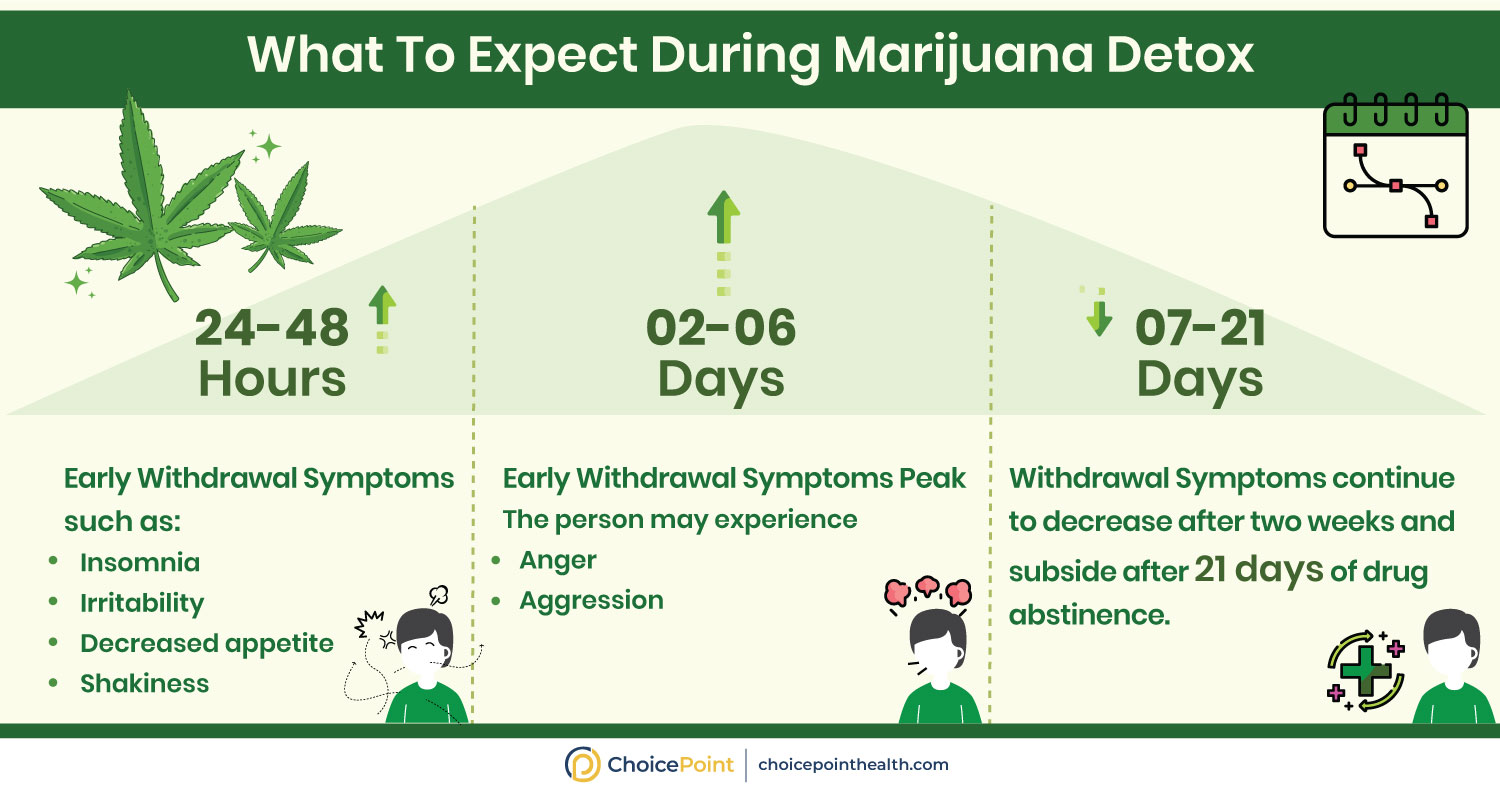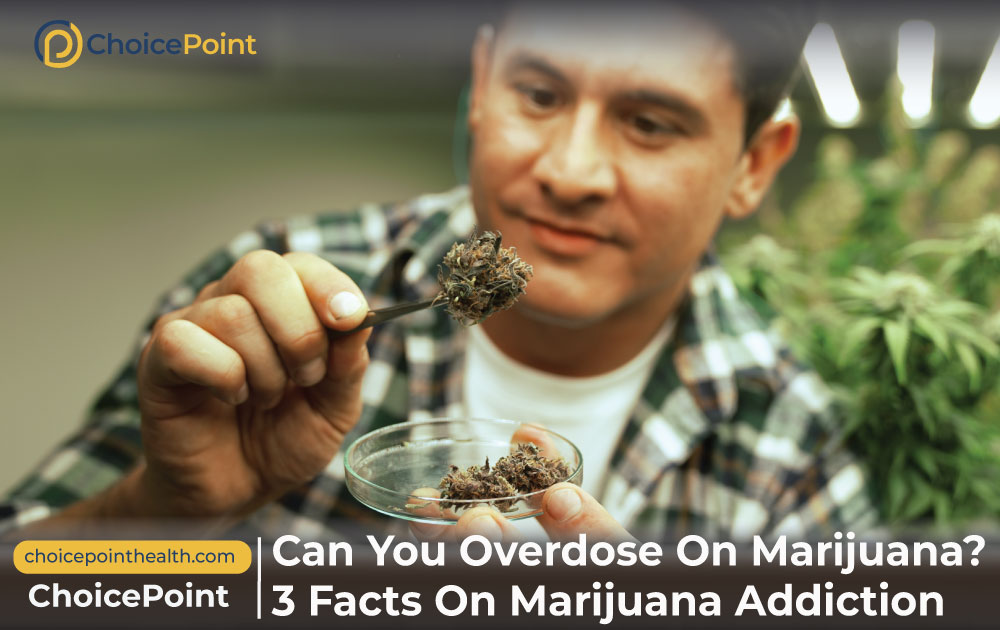Can You Overdose On Marijuana? Marijuana addiction is fairly controversial as it is medicinally legal in 38 states and recreationally legal in 23 states. This leads to the perception that marijuana is neither addictive nor harmful. However, non-addictive claims are more of a myth than reality.
It has been reported that 30% of people who use marijuana have developed some degree of marijuana use disorder. This alarming increase in marijuana abuse calls for a deeper understanding of this drug and its potential side effects.
In this blog, you will find answers to:
- What is marijuana?
- Can you overdose on marijuana?
- Research-based facts on marijuana addiction
- Information on how to recover from marijuana addiction
Table of Contents
Different Forms And Components of Marijuana
Marijuana (weed) is a mixture of dried flowers of the plant Cannabis sativa. It has over 480 different components, but THC (delta-9-tetrahydrocannabinol) is the major psychoactive ingredient. The common street names of marijuana are:
- Weed
- Pot
- Dope
- Joint
- Aunty Mary
- Ganja
Marijuana is abused in two forms:
1. Smoking Marijuana
Weed or marijuana is smoked in cigars, vape, and cigarettes. The effects of inhaling this drug begin almost immediately.
2. Edible Marijuana
Edible marijuana is more likely to cause an overdose because the effect can kick in after up to 2 hours. This leads people to ingest more amounts to get the results immediately.

Were You Aware? People who frequently use Marijuana were found to be about one-third more likely to develop heart disease compared to non-users.

Were You Aware? People who frequently use Marijuana were found to be about one-third more likely to develop heart disease compared to non-users.
Question Of The Hour: Can You Overdose On Marijuana?
Now, to answer your question, can you overdose on marijuana (weed)? Yes, overdosing on marijuana is possible and can have fatal long-term consequences on both mental and physical health.
Though the overdose is not life-threatening, as in the case of opioids, where a person may die, marijuana toxicity is extremely dangerous. It impairs the judgment, which may lead to accidental deaths and injury.
Signs of Marijuana Overdose
Marijuana overdose is not life-threatening, but the treatment still requires medical intervention and hospitalization. Please be aware of these signs of weed overdose:
- High blood pressure
- Panic attacks or extreme anxiety
- Fast heart rate or chest pains
- Hallucinations and delusions
- Decrease judgment and perception
- Poor muscle coordination
What To Do In Case Of Marijuana (Weed) Overdose?
In case of weed overdose, please follow these steps:
- Call emergency services or 911
- Drive the loved one to the nearest emergency room
- If a person has stopped breathing, perform CPR (Cardiopulmonary resuscitation)

How Long Does a Marijuana Detox Take?
3 Facts About Marijuana Addiction: Breaking Down The Research
Marijuana is the most commonly used drug in the United States. It has been reported that 55 million Americans used this drug in the past year. Despite excessive use, the general public is not fully aware of the dangers of Marijuana addiction. Here are some research-based facts to encourage you to abstain from this drug:
FACT 1: The Latest Researches Regarding Marijuana Abuse Reveals Alarming Side Effects
THC present in marijuana produces mind-altering effects on both body and mind. Short-term side effects of weed use include:
- Impaired short-term memory
- Impaired motor coordination
- Poor judgment
- Paranoia and Psychosis
Furthermore, CDC (Centers for Disease Control and Prevention) reports the following adverse long-term effects:
a. Marijuana Addiction Can Increase The Risk of Heart Diseases
A study published by Stanford Medicine reports marijuana increases the risk of heart disease, stroke, and heart attacks. Another study reported a 34% increase in the risk of heart failure in people who frequently used Marjiana compared to those who have never used it.
b. Weed (Marijuana) Negatively Impacts Mental Health
According to CDC, the Centers for Disease Control and Prevention, frequent use of this drug is known to cause serious mental disorders such as:
- Psychosis ( can not differentiate reality from hallucinations)
- Paranoia
- Schizophrenia (people hear or see things that are not real)
- Depression
- Anxiety
- Suicidal thoughts
c. Use Of Marijuana Is Linked To Poor Cognitive (Brain) Health
According to NIDA (National Institute of Drug Abuse), there is substantial evidence that weed can cause long-term or possibly permanent damage to the brain. Some of these adverse effects include:
- Memory impairment
- Affects memory
- Affects decision making
- Frequent use can lead to impulsive behavior

Did You Know? A study estimates that 30% of Schizophrenia cases among men might have been prevented by abstaining from marijuana.

Did You Know? A study estimates that 30% of Schizophrenia cases among men might have been prevented by abstaining from marijuana.
FACT 2: Altered Potency of THC In Marijuana Is Raising Major Concerns
As discussed earlier, THC is the major component in marijuana that produces euphoria. Did you know that in the 1960s- 1980s, THC content was less than 2%, whereas in 2017, the THC content rose to 17-28%?
This rising THC is resulting in increasing the addictive potential of marijuana. Furthermore, various studies are reporting these side effects:
- A study showed an average loss of 8 IQ points with consistent use of weed.
- Use of Cannabis in adolescent age significantly increases the risk of psychosis.
- Another study reported that high-potency THC (greater than 15%) increased the risk of psychosis by three times. At the same time, a lower dose of THC (less than 5%) did not result in any psychotic symptoms.
FACT 3: Mixing Marijuana With Other Drugs Can Be Life-Threatening
While using marijuana alone is not life-threatening, mixing it with other drugs and alcohol can have fatal consequences. Mixing marijuana with alcohol or prescription drugs can lead to:
- Unconsciousness
- Delay in motor response
- Dehydration
- Decrease judgment
- Depression
- Increased risk of paranoia and hallucinations
- Long-term effects include the risk of liver and kidney diseases
Did you know? Overdose is preventable if you seek timely help. If you or a loved one is suffering from Marijuana addiction, please call us at 844.445.2563 so we can help you lead a sober and healthy life.
How Can I Recover From Marijuana (Weed) Addiction?
People think that due to the legal status of Marijuana in some states, they have the free pass to use the drug without considering its side effects. The mixed claims about the addictive properties of marijuana have also led people to turn an eye to its abuse potential.
Marijuana addiction is real, and it can happen to anyone. If you are struggling to quit marijuana or reduce its use, we suggest you seek medical help. Some approaches to treat marijuana (weed) addiction include:
A. Integrated Approach Combining Medical Detox With Therapy
While you may be tempted to quit weed cold turkey, it may lead to intense withdrawal symptoms such as:
- Insomnia
- Decreased appetite
- Tremors and shaking
- Sweating or chills
- Decreased appetite
- Mood swings and irritability
Currently, there is no medication specific for Marijuana treatment, but under the supervision of doctors and medical staff, the withdrawal symptoms can be managed through a medical detox. Furthermore, you will be counseled on how to manage cravings and make your recovery long-lasting.
B. Dual Diagnosis Treatment
As discussed earlier, Marijuana addiction is often linked with mental health problems. A dual diagnosis can treat both disorders simultaneously. Some benefits of dual diagnosis include:
- A more targeted approach to mental health and addiction treatment.
- Helps to understand the connection between mental health and addiction.
- Treats underlying causes of addiction.
- Reduces the chances of a relapse.

Did You Know? Research shows that dual-diagnosis patients had a higher rate of drug abstinence (39%), and psychological symptoms also improved at a fantastic rate of 60-68%.

Did You Know? Research shows that dual-diagnosis patients had a higher rate of drug abstinence (39%), and psychological symptoms also improved at a fantastic rate of 60-68%.
Holistic Care For Marijuana Addiction At ChoicePoint
ChoicePoint has the latest strategies and experienced staff to help you or your loved ones recover. We strictly comply with all medical and ethical guidelines to bring you the latest addiction and mental health treatments.
We understand that recovery from addiction can be challenging. That is why we let patients decide the pace of the treatment. We offer the following levels of care for alcohol and drug addiction treatment:
- Inpatient Treatment
- Partial Care Program
- Outpatient Program
- Intensive Outpatient Program
- Dual Diagnosis
- Telehealth Addiction Treatment
Are We A Trusted Addiction Treatment Center? Here is what our recent client has to say:
“I have a family member who recently completed treatment at ChoicePoint. I witnessed firsthand the compassion, care, and clinical expertise extended to my loved one; I am beyond grateful for this. It is so unbelievably touching to see a company dedicated to helping others sustain positive life changes.” Allison Beth Maxon
Learn More About Marijuana Addiction and Overdose
People often ask us these questions about marijuana addiction.
What is the Definition of a Marijuana Addict?
There are three defining characteristics of a marijuana addiction:
- Compulsive Use of Marijuana
- Facing withdrawal symptoms when trying to stop the use
- Facing a relapse when trying to abstain from the drug
What is Considered Heavy Marijuana Use?
Although there is no clear definition or criteria for heavy or light Marijuana use, heavy use typically means using the drug daily. In contrast, light use means using the drug once a month or less.
How Long Does Greening Out Last?
Greening out is a slang term for marijuana overdose. The symptoms can last anywhere from a few hours to a day. The duration depends on:
- Individual’s tolerance
- Amount consumed
- Potency consumed
- Hydration levels
- How quickly the drug was consumed
How Long Does it Take for Cannabinoid Receptors to Return to Normal?
Usually, it takes about four weeks of abstinence from Cannabis for receptors to turn back to normal.
Can You Die from a Marijuana Overdose?
Direct death from Marijuana overdose is unlikely. However, overdosing impairs the judgment, which may lead to accidental death. For example, driving after Marijuana abuse may lead to injury or accidental death due to cloudy judgment.
Medical Disclaimer:
ChoicePoint aims to improve the quality of life for people struggling with substance use disorder and mental health issues. Our team of licensed medical professionals research, edit and review the content before publishing. However, this information is not intended to be a substitute for professional medical advice, diagnosis, or treatment. For medical advice please consult your physicians or ChoicePoint's qualified staff.










Review Can You Overdose On Marijuana? 3 Facts On Marijuana Addiction.